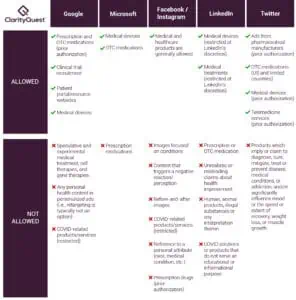If you are in charge of marketing for a healthcare, medical device, or biopharmaceutical company, digital advertising is likely a cornerstone of your strategy to get potential customers to your website and in front of your content.
Before you jump into planning and creating campaigns, there are many digital advertising restrictions that may apply to your company, product, or service.

We know you’re probably salivating thinking about all of the A/B testing you have planned for your ad copy and landing pages once you start collecting campaign data.
But before you start testing and optimizing your campaigns, familiarize yourself with some of the advertising restrictions you might encounter on major ad platforms.
Health advertising on Google, Microsoft, Facebook, Instagram, LinkedIn, and Twitter
The chart below lists what is generally allowed and not allowed on each platform. While there are nuances to each rule, this guide should serve as a starting point for your ad planning. Consult each platform’s full advertising policies for official guidance.
Google removed COVID-19 restrictions from its sensitive events policy in June 2023.
As with many policies and regulations, there are gray areas for healthcare products, devices, and pharmaceuticals, especially for cutting-edge technology.
Don’t let these restrictions put you off from digital advertising. With some creative strategy, you can advertise while avoiding your ads being taken down or actions taken against your account.
Also, don’t be surprised to see Microsoft Ads on our list of ad channels. While Microsoft Ads might not get as much marketing love as Google Ads, it still has a healthy, growing audience that you shouldn’t dismiss when planning your paid search campaigns.
Getting creative with ad content and making sense of it all
Is your organization in need of a team that can create ad copy and landing pages so you can get your message across without being shut down?
Are you looking to speak with digital advertising experts who can help you make sense of it all and develop a digital marketing strategy around any potential restrictions?



